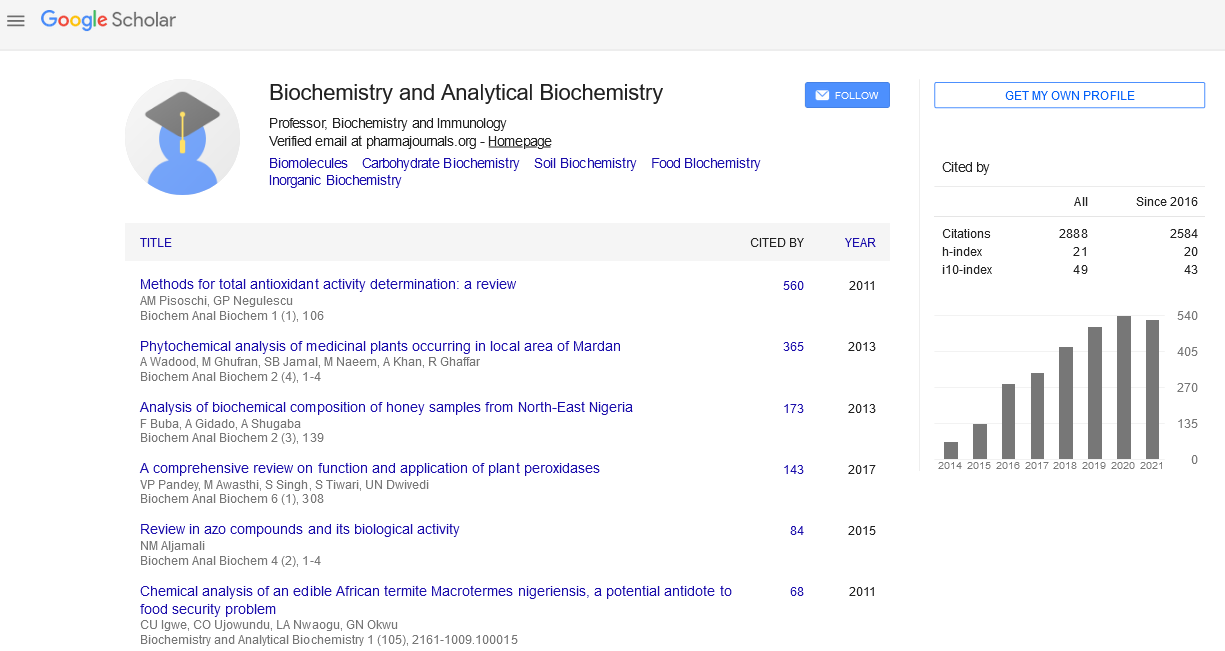Indexed In
- Open J Gate
- Genamics JournalSeek
- ResearchBible
- RefSeek
- Directory of Research Journal Indexing (DRJI)
- Hamdard University
- EBSCO A-Z
- OCLC- WorldCat
- Scholarsteer
- Publons
- MIAR
- Euro Pub
- Google Scholar
Useful Links
Share This Page
Journal Flyer

Open Access Journals
- Agri and Aquaculture
- Biochemistry
- Bioinformatics & Systems Biology
- Business & Management
- Chemistry
- Clinical Sciences
- Engineering
- Food & Nutrition
- General Science
- Genetics & Molecular Biology
- Immunology & Microbiology
- Medical Sciences
- Neuroscience & Psychology
- Nursing & Health Care
- Pharmaceutical Sciences
Chronic hepatitis C virus infection: Epidemiology, treatment and barriers of management in non type 1 genotypes infection
International Conference on Clinical Chemistry & Laboratory Medicine
October 17-18, 2016 Chicago, USA
Shagufta Ahsan
Complete Care Health Network, USA
Posters & Accepted Abstracts: Biochem Anal Biochem
Abstract:
Chronic Hepatitis C (HCV) infection occurs in more than 130 to 150 million individuals worldwide. Twenty percent of patients chronically infected with HCV progress to cirrhosis. Other than cirrhosis, Chronic HCV infection is strongly associated with liver cancer and end-stage liver disease requiring transplantation. However, as with the approval of the first generation protease inhibitors telaprevir and boceprevir, we see significant progress in the treatment of chronic hepatitis c infection. However this has benefited many but not all patients with HCV infection as protease inhibitors have never been approved for genotype 2 and 3. No direct acting antiviral agents have ever been approved until recently. Very recently sofosbuvir, a direct acting antiviral agent which is a nucleotide polymerase inhibitor, has been approved for genotypes 2, 3, (and genotypes 1 and 4), where as multiple direct acting agents are approved and used for genotype 1 which includes but is not limited to Simeprevir. Now patients with genotype 3 have emerged among the hardest to treat. The reason behind this treatment failure of genotype 3 infections is that genotype 3 still remains a challenge to the efficacy of even newer regimen Also genotype 3 is associated with a more rapid progression of the disease. In addition, genotype 4 is increasing in Europe. Thus we want to emphasize the ongoing need for new, simpler therapeutics using direct acting antivirals that target various stages of the HCV lifecycle to eradicate HCV without concomitant INF.
Biography :
Email: shaguftaahsan@yahoo.com


